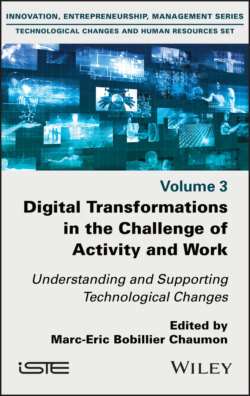Читать книгу Digital Transformations in the Challenge of Activity and Work - Группа авторов - Страница 16
1.3. Five paradoxes of the diffusion of technologies in/on the activity 1.3.1. Sense of loss of control over the activity vs increased control over the activity
ОглавлениеThe multiplication of digital media at work (shared digital schedules and spaces, messaging and social networks, collaborative platforms, reporting tools) is accompanied by a requirement for permanent availability and reactivity. The activity is thus increasingly determined, punctuated and emphasized by the various digital injunctions, warnings and solicitations. In the research we conducted on the impact of technology on the management profession (Bobillier Chaumon et al. 2018), we identified a category that we called “self-service or dispossessed managers”. They felt deprived of their ability to define or control their work schedule (work “imposed” by shared schedules) or simply to keep and achieve the objectives they had set for themselves during the day (work “prevented” by the many digital interruptions that required them to complete the current activity in order to initiate a new, unplanned task). This feeling of loss of control over the activity was paradoxically consubstantial with the increase in control that employees experienced in their activity.
Indeed, more and more so-called prescriptive (Bobillier Chaumon 2017) or info-normative (Frenkel et al. 1992) technical systems determine and frame the work to be done, but are also capable of assessing whether the work has been done well, that is, whether it is compatible with labor standards and norms. The software packages that manage the dialogue between advisors and customers in call centers, the voice-picking devices that dictate each action to the warehouse agent to make a pallet, thus establish what must be done, how it must be done, according to what timeframe and with whom.
